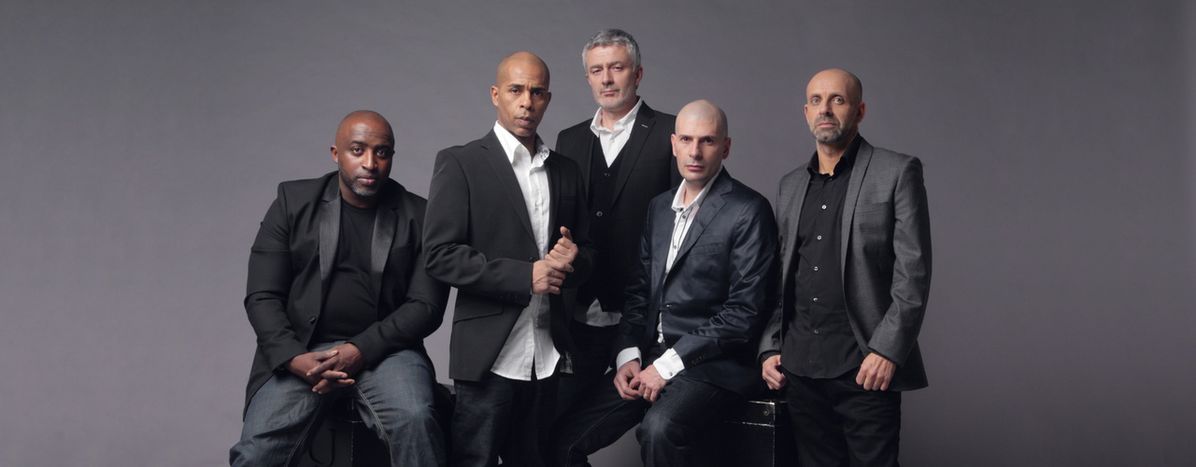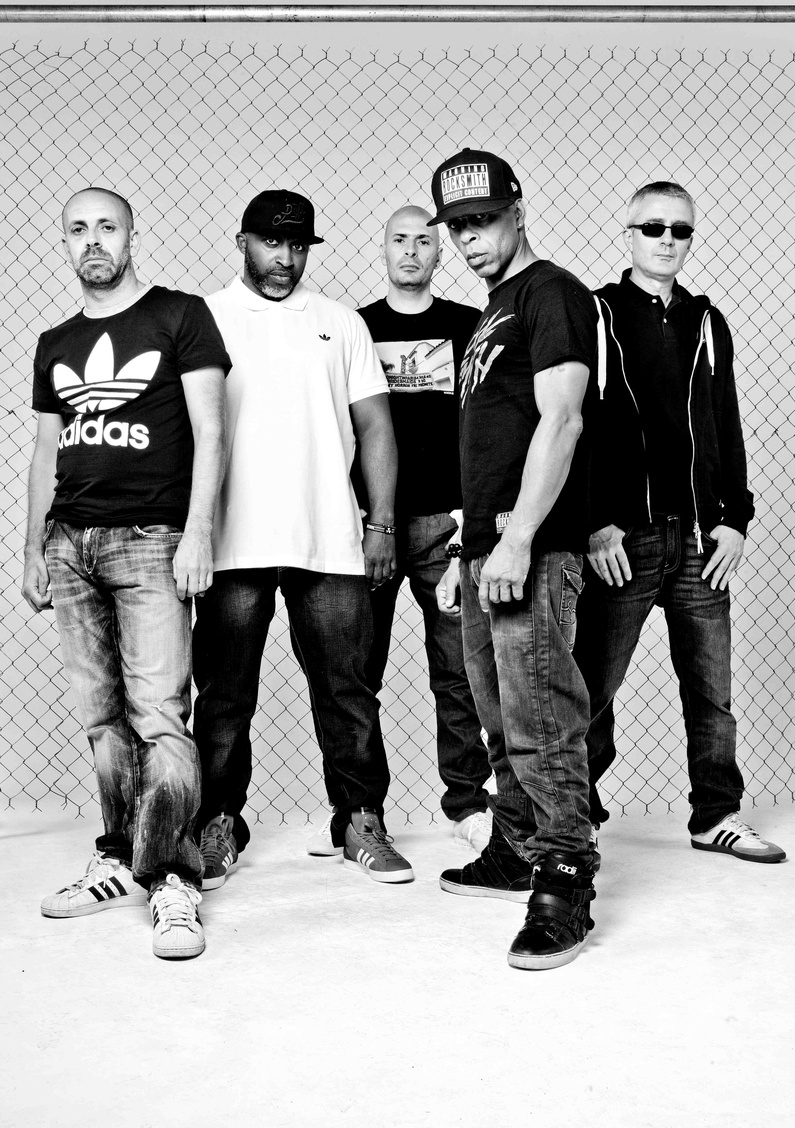
Shurik'n : "Rap could be better tomorrow."
Published on
Translation by:
Carrina LaCorataAlmost twenty years ago, IAM came out with L’École du micro d’argent (The School of the silver mirophone), an album that's a part of the French rap hall of fame. Since then, two decades have passed, but the lyrics remind us of yesterday, which isn’t that long ago. The classics, the time period, the Panama Papers, Nuit Debout (Up All Night)… An interview by the sword with one of the last samurais.
“Hello?” The voice is familiar. You recognize it starting from the very first words. It’s the voice of a samurai. The one from the first couplet in “L’École du micro d’argent” and “La Lettre” ("The Letter") which ends: “Il vient à peine de sortie de son œuf que déjà Petit Frère veut être plus gros que le bœuf” ("He's only just out of his egg and already Little Brother wanna be bigger than a steer"). It’s the voice of Shurik’n, member of one of the biggest French rap groups: IAM.
With his unique flow and sleek writing, the rapper has been honing his position in the French hip-hop scene for nearly 30 years. But at almost fifty years old, the duo from Akhenaton, however, still have a lot to say. For several days, the Marseille group is back in the studio to record a new album that will come out in 2017. Between two recording sessions, Shurik’n picked up the phone to talk to us about past punchlines, current movements, and his vision for the future. Back to the future linking up from the planet Mars.
cafébabel: In 1997, you came out with L’École du micro d’argent, an album that had a considerable cultural, but also social, impact. Twenty years later, what is the role of rap in society?
Shurik’n: We would have preferred this not to be the case, but some of our lyrics are still in the news. I’m thinking of “Demain, c’est loin” ("Tomorrow, that's far away"), of “Petit Frère” ("Little Brother"), of “La Fin de leur monde” ("The End of their world")… But, you know, rappers don’t have a particularly important role to play, everyone has a role to play, all musical trends. From the moment you position yourself in your lyrics and in your message, so that you have things to say and you defend them, it’s the same for everyone. The difference today is that rap has suffered from the same changes as the society it lives in; although initially, as it has long been proclaimed, it was a parallel culture. In the end, it was assimilated and evolved with the same idiosyncrasies.
cafébabel: So you’re not happy with this evolution?
Shurik’n: No, but it’s different. Today, what was mainstream at the time has become more underground. Rap has diversified. So there you have it, the broader it is, the more of a following there is, and the more garbage there is. There are really all levels, but the advantage is that now we have a way of choosing what we want to listen to. You can go hear a little group in the heart of Latin America that really blows you away, you can stay up to date with what they are doing around the world… You can listen to anything you want to listen to and not listen to what you don’t want to listen to.
cafébabel: How about you, who are you following right now?
Shurik’n: Of course there are affinities, so for me, I usually like people who have a tendency to go towards writing like Nekfeu or Big Flo et Oli. In the middle generation, I really like Youssoupha, I think he has a beautiful way with words. But after that it’s a little random, there are an enormous amount of things to discover, it’s truly immense… Proof, if necessary, that rap remains a very long-lasting and very practical art form in France and around the world.
 cafébabel: You were talking about Big Flo et Oli or 1995’s style, but there's also Doc Gyneco who came out with Première Consultation and you who re-edited L’École du micro d’argent and are going to have an anniversary concert in 2017. How do you explain this return to this sort of "traditional" rap?
cafébabel: You were talking about Big Flo et Oli or 1995’s style, but there's also Doc Gyneco who came out with Première Consultation and you who re-edited L’École du micro d’argent and are going to have an anniversary concert in 2017. How do you explain this return to this sort of "traditional" rap?
Shurik’n: I don’t know, especially because we don’t have the point of view that “rap was better before." For us, rap could be better tomorrow. Of course, we’re from the earlier rap, but the benefit of this music is that the recorders are always set back to zero. You’re judged for the new album you release and for your performance. Doc Gyneco will be judged for that. If he comes back and his performance is to that level, he’ll be well received; now if this isn’t the case, people are going to doubt the sincerity of his return. That’s true for every one of us.
cafébabel: But they continue to constantly ask you to play the songs from L’École du micro d’argent. How do you explain the success of this album?
Shurik’n: We still don’t know, and we stopped asking ourselves that question. There’s no formula. If there was one, we'd all be at the Bahamas. At the Bahamas now, not even Panama… (laughs). Yet, at the first listen to this album, there was no obvious song; it is obvious, however, from the concepts or the ego trip with a warrior image, the lyrics are harsh, the flow is striking… There was really a strong visual, a significant investment when it comes to the clips, and that came into play. It’s not like today where, with three iPhones, you make a clip… But, initially, everyone put their hands on their heads and said, “How are we going to work on this album?” And then, there you have it; it’s an album that’s still alive today. Sometimes, there’s a magic that happens, it’s unexplainable.
cafébabel: Are there albums that meant as much to you as this opus meant for some people?
Shurik’n: Of course, Bob Marley’s Exodus or Stevie Wonder’s Songs in the key of life. He’s really my idol!
cafébabel: At fifty years old and after three decades making music, what still inspires you?
Shurik’n: Of course, now, I talk about fatherhood, but I talk about a lot of other different things. Getting older, living next to normal people -- that gives you a lot of things to observe and so a lot of themes to tackle. And then there are still plenty of reasons to write today, unfortunately…
cafébabel: For example, if you had to re-write “La Fin de leur monde” today, what would you talk about?
Shurik’n: Oh well that’s easy. This past year, it was still a year full of shit… And I think that at that point, we need to smile, some positivity, good things. We’re not going to use big words, but the year before, that was the disaster, and there’s still residue, we’re in a country prey to doubt, suspicion, suspicious looks…
cafébabel: So on the album you’re making, you want to recount more positive things?
Shurik’n: No, you can tackle plenty of themes, but I think that it needs to stay bright. I was talking about life in general there. I hope that some positive things will happen this year because last year was gloomy, dark. I think that everyone is really fed up with experiencing these kinds of emotions.
cafébabel: And you think it can get better?
Shurik’n: I would like that, but I have trouble believing it at a global level with all the conflicts or affairs like the Panama Papers…
cafébabel: Actually, when, in “Demain, c’est loin," you said “les générations prochaines seront pires que nous, leur vie sera plus morose” ("the next generations will be worse than us, their life will be more morose"), you were visionary.
Shurik’n: Yeah, that’s what we thought at the time… After, you can tell yourself it’s downhill or to still have hope. And it’s this little glimmer that characterizes us, even when it’s going very very badly, there’s still reason to believe it.
cafébabel: On this topic, what’s your outlook on Nuit Debout?
Shurik’n: We've already participated in popular movements like that. It’s good, it shows that there are still people who pay attention to certain things, but we still find ourselves faced with the same problem, like the Indignados in Spain: in the long run, the problem diminishes because it doesn’t get answered at the very top. They’re not even up to date with the question, the real situation.
cafébabel: So what message would you like to pass along to the young Europeans who still believe it?
Shurik’n: It is going to be necessary to roll up your sleeves. If you want change, you have to own this change. And quickly those generations are coming to power, hoping they won’t fall on the same side as the others. It’s time! Everything’s changing, technology, cultures… but politics isn’t changing. The leaders all have the same path: get to power at the same age, and as a result are always completely disconnected from the reality of the world they are supposed to govern.
cafébabel: Exactly, in 2017, this will be the anniversary of L’École du micro d’argent, but also the French presidential election…
Shurik’n: Yeah, and it’s not looking very promising…
cafébabel: That doesn’t make you want to work on something other than music?
Shurik’n: No, we never wanted to do that. We’ve had tons of offers in all areas, except one that we don’t want to mention… But we always refused. When you take sides with someone, you lose your credibility. And there's always the risk of misrepresentation, we’re not living with the Care Bears. So, no, we prefer to keep making music, to express our ideas and to spread our messages freely.
___
This article was written by La Parisienne de cafébabel. Protected Designation of Origin.
Translated from Shurik'n : « Le rap, ça peut être mieux demain »



